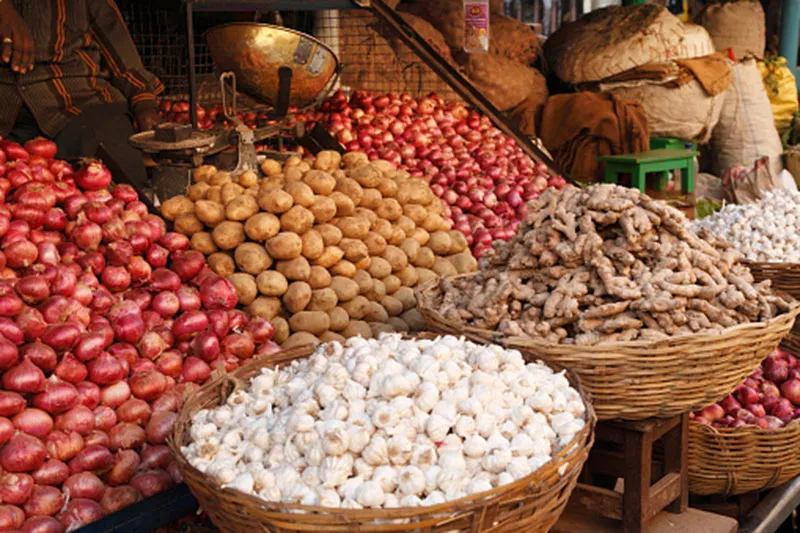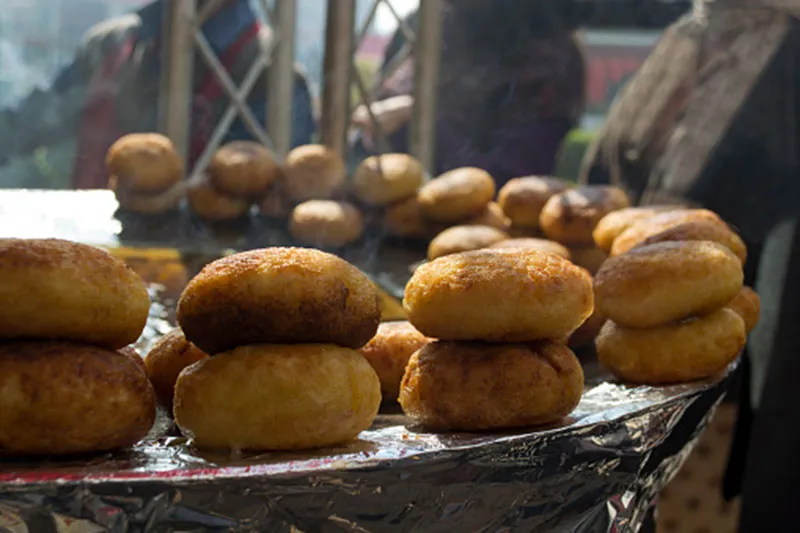Meet India’s potato king who has raised Rs 25 cr Series-B funding
For a second, munch on these crisp facts.
We Indians consume one lakh tonnes of potatoes daily.
India is the second largest producer (after China) with 4.75 crore tonnes of potatoes produced last year.
The fourth most popular food in the world after wheat, rice, and maize, the potato overthrew the banana in India as the primary source of starch many centuries ago.
It is one ‘foreign power’ that has successfully conquered India, so much so that the fact that it was introduced by the Europeans in India around the 17th century almost sounds like fiction.
As does the fact that potato is a highly nutritious, easily digestible, wholesome food containing carbohydrates, proteins, minerals, vitamins and high quality dietary fibre. According to the Central Potato Research Institute (CPRI), potato provides more nutrition than cereals and vegetables.
Burp!
There will hardly be a home where, if I may add, this ugly-looking spud is not transformed into sweet-smelling and delicious fries, mash or curry. It often makes it to the front-page news when its price goes skyrocketing, with the potential to topple the government of the day.

Thus, it is not without reason that this modified stem, masquerading as a root vegetable, is considered a cash crop by farmers here. “Many vegetable farmers in the lower end of technology grow potato because they need quick cash,” says Hemant Gaur, Founder and Director of Siddhi Vinayak Agri Processing (SV Agri), a Pune-based potato supply chain company.
Starchy affair
Forty-five-year-old Hemant, who had worked in the corporate sector for 16 years with organisations like Marico, ITC, and Walmart, realised that potato business was a good business idea.
The entire potato supply chain from the farm to the plate is highly disconnected, and Hemant knew that if he could bring some order and integrate the chain then a lot of value could be generated. “Because there were gaps in the chain, we were losing out on the value of the product,” he tells me. Hemant was making a stopover in Bengaluru while on a tour of south India to meet farmers.
“I wanted to sit on the other side of the table. I knew I would get buyers,” says Hemant about his decision to strike out on his own. He quit his corporate job and decided to take a deep dive into entrepreneurship. But the question was who would back him?
“I come from a typical middle-class family from a village near Delhi called Patparganj. Ours is a family of engineers and no one had ever ventured into the world of business,” says Hemant. But he believed that his only chance to test the waters was before he turned 35. “After that you have a lot of liabilities and it becomes risky to quit a well-paying job for the uncertainties of building your own business.”
With nothing more than his conviction and the assurance of some potato farmers, this graduate from the GB Pant University of Agriculture and Technology, Uttarakhand, armed with a post graduate degree from IRMA University, took the plunge.
“I was lucky to have been backed by farmers who were ready to trust me with their produce,” he recalls. Such emotional investment is priceless. And as a gesture of gratitude, Hemant has given them equity in his company.
The root of the matter

Hemant established SV Agri with Co-founder Ganesh Pawar in 2009 to provide a range of pre-and-post-harvest solutions to potato farmers. He reveals that the company has raised Rs 25 crore funding in a Series B round led by Lok Capital and existing investor Aspada. Aspada confirmed that its contribution is Rs 10 crore.
In 2011, SV Agri had raised Rs 5 crore from SONG, a fund backed by Soros Economic Development Fund, Omidyar Network and Google, which is also managed by Aspada. “We have been able to give part exit to SONG,” adds Hemant.
Talking about his revenue, Hemant says that they are making approximately Rs 60 crore and in the next three years, they have projected to do Rs 500 crore. “We are in a biological product market. It takes four years to actually make a product -- the potato seed (but the potato is a 90-day crop) -- that can be then given to farmers,” says Hemant, adding,
“I believe I can work with potatoes for the next 10 years.”
Expectedly, the potato market is huge. But the concern for all the stakeholders in the potato industry is how to negotiate this hurdle-infested path. Explaining the broken chain, Hemant says, “The guy who sells seeds has nothing to do with the output and does not buy back the produce from the farmers. There’s another guy who buys the produce. Then there’s a third guy who stores the produce, but he has nothing to do with quality. For him, it is ‘these many bags in, these many bags out.’ He is just into the renting (storage) business. And then there’s yet another guy who is a processor (manufacturer of chips and potato products) who gets his material from whatever is available. So, we decided to stitch the chain together and develop some volume, because without volume you cannot do anything. The second important thing we did was to apply technology wherever we could.”
In its facility near Pune, SV Agri uses aeroponics, the science of growing plants in the air or mist environment, which yields good quality seeds and high returns. The seeds are then multiplied in a lab. “The potato is like a Xerox machine. There’s the software part and the hardware part. For software, we need access to germ plant and different varieties, and for the hardware, we require aeroponic labs.” Hemant says they are working with CPRI’s varieties and some Dutch varieties as well, and will soon release new varieties in the market.
Chipping in

Essentially, SV Agri makes good quality seeds available to the approx 3000 farmers it works with across India and buys back a substantial amount of produce from them. “This allows me to introduce new varieties. In India, only 10 to 12 varieties are available commercially. While in the Netherlands, 50 varieties of potato are available in the market,” Hemant explains.
Though it is difficult for the consumer to identify the variety, Hemant says there are always takers for quality products. “Even in a market like Bihar, there are varieties that will get a premium of a rupee or two a kg which is 10 to 15 percent of the cost of potato. Thus, we have a lot of opportunities to introduce good variety seeds to the farmers.” Hemant feels it also creates a lot of competition in the market and in all likelihood the farmer will have few chances of getting exploited. “Having said that, I don’t like the use of the term ‘exploited’ in relation to farmers. I would rather say that they were earlier working in a different business environment. I am just providing them with a different option.”
Once the company buys back the produce, it is then sold to around 65 small and large processors or manufacturers like MacCain, Akash Namkeen, Yellow Diamond, Pepsico, ITC and others. The company also works closely with the processors in terms of providing training and expertise as well as supplying machinery -- thus, taking care of the whole stack. “Many times the manufacturers do not have the capability or awareness to use the produce to its maximum. Sometimes, in the peeling process itself, he may lose 10 percent of the potato. We work with them so that they can get the best out of their machines.”
SV Agri has a joint venture with a Dutch company Mooij to set up and modify storage rooms for potatoes. If the storage conditions are not conducive, the produce is as good as useless because of the accumulation of large sugar content. “We have good access to technology on ventilation and storage to provide modified facilities in Gujarat, Indore, Uttar Pradesh, and Bengal.”
According to Kartik Srivatsa, Co-founder and the Managing Partner of Aspada Investment Advisors,
“The focus for us was that SV Agri was an end-to-end supply chain from the farm to the consumer. They have a strong farm engagement and are adding a lot of social capital with a nuanced understanding of the challenges faced by farmers.”
Not for couch potatoes
When Hemant started his agri-business, he knew he would be competing against some heavyweights. “There are only a few organized players in this market. Companies like ITC, Pepsico, Cadila (agro), and Mahindra agri-business have their own streamlined supply chain. I wouldn’t say that Pepsico is our competitor because we also supply them with potatoes. Though we also supply to ITC, I compete with them in the seed division,” says Hemant. As far as 'real' competition is concerned, Hemant adds that the availability of good quality seeds is only three percent. “So I am essentially competing with the rest 97 percent of the potato growers who use the tubers directly.”
Though the SV Agri team today has the strength of 50 employees, in the early days it was difficult for him to employ the right people.
“Asking people to sell potatoes is a tough challenge. At that time, I could not offer much money, only dreams.”
His team today includes graduates from IIMs and IITs. “My first employee from IIT Kharagpur was introduced to me through a common friend. He had worked in ITC for five years and wanted to do something that created an impact. He went through a steep learning curve as he was coming from a large organization to a small company. Today, he holds five percent equity in the company.”
Hemant, who enjoys potatoes mostly as fries and in salads, says since he struck out as an entrepreneur, he has been able to tame his ego. “When you are in a corporate job you tend to have a large ego. But I am a happier man today. I think I’ll live longer by five more years,” he quips.
The fact that Hemant has succeeded in reaching this far is no joke. In a country, where the agriculture sector is not considered as glamorous as say, the IT industry, it is a wonder that Hemant is now offering his team and the farmers he works with more than just dreams -- all riding on the humble potato.
As A A Milne, creator of Winnie the Pooh, said, “What I say is that, if a man really likes potatoes, he must be a pretty decent sort of fellow.”
Do you have a favourite potato story? Do share in your comments.






